-
 Russian figure skating prodigy Valieva set for comeback -- but not at Olympics
Russian figure skating prodigy Valieva set for comeback -- but not at Olympics
-
Barcelona midfielder Lopez agrees contract extension

-
 Djokovic says 'keep writing me off' after beating Sinner in late-nighter
Djokovic says 'keep writing me off' after beating Sinner in late-nighter
-
US Justice Dept releasing new batch of Epstein files

-
 South Africa and Israel expel envoys in deepening feud
South Africa and Israel expel envoys in deepening feud
-
French eyewear maker in spotlight after presidential showing

-
 Olympic dream 'not over', Vonn says after crash
Olympic dream 'not over', Vonn says after crash
-
Brazil's Lula discharged after cataract surgery

-
 US Senate races to limit shutdown fallout as Trump-backed deal stalls
US Senate races to limit shutdown fallout as Trump-backed deal stalls
-
'He probably would've survived': Iran targeting hospitals in crackdown

-
 Djokovic stuns Sinner to set up Australian Open final with Alcaraz
Djokovic stuns Sinner to set up Australian Open final with Alcaraz
-
Mateta omitted from Palace squad to face Forest

-
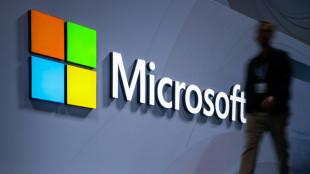 Gold, silver prices tumble as investors soothed by Trump's Fed pick
Gold, silver prices tumble as investors soothed by Trump's Fed pick
-
Trump attorney general orders arrest of ex-CNN anchor covering protests
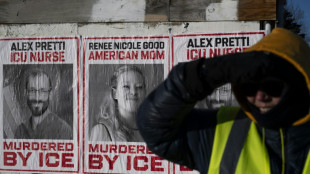
-
 Djokovic 'pushed to the limit' in stunning late-night Sinner upset
Djokovic 'pushed to the limit' in stunning late-night Sinner upset
-
Tunisia's famed blue-and-white village threatened after record rains

-
 Top EU official voices 'shock' at Minneapolis violence
Top EU official voices 'shock' at Minneapolis violence
-
Kremlin says agreed to halt strikes on Kyiv until Sunday

-
 Carrick calls for calm after flying start to Man Utd reign
Carrick calls for calm after flying start to Man Utd reign
-
Djokovic to meet Alcaraz in Melbourne final after five-set marathon

-
 Italian officials to testify in trial over deadly migrant shipwreck
Italian officials to testify in trial over deadly migrant shipwreck
-
Iran says defence capabilities 'never' up for negotiation

-
 UN appeals for more support for flood-hit Mozambicans
UN appeals for more support for flood-hit Mozambicans
-
Lijnders urges Man City to pile pressure on Arsenal in title race

-
 Fulham sign Man City winger Oscar Bobb
Fulham sign Man City winger Oscar Bobb
-
Strasbourg's Argentine striker Panichelli sets sights on PSG, World Cup

-
 Jesus 'made love': Colombian president irks Christians with steamy claim
Jesus 'made love': Colombian president irks Christians with steamy claim
-
IAEA board meets over Ukraine nuclear safety concerns
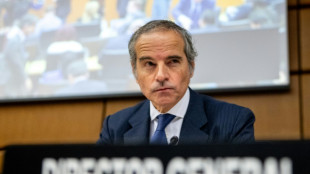
-
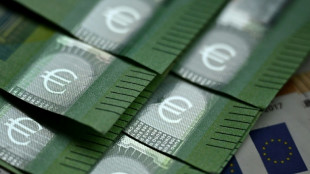 Eurozone growth beats 2025 forecasts despite Trump woes
Eurozone growth beats 2025 forecasts despite Trump woes
-
Israel to partially reopen Gaza's Rafah crossing on Sunday

-
 Dutch PM-elect Jetten says not yet time to talk to Putin
Dutch PM-elect Jetten says not yet time to talk to Putin
-
Social media fuels surge in UK men seeking testosterone jabs

-
 Forest face Fenerbahce, Celtic draw Stuttgart in Europa League play-offs
Forest face Fenerbahce, Celtic draw Stuttgart in Europa League play-offs
-
US speed queen Vonn crashes at Crans-Montana, one week before Olympics

-
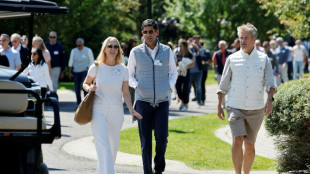 Trump nominates former US Fed official as next central bank chief
Trump nominates former US Fed official as next central bank chief
-
Alcaraz defends controversial timeout after beaten Zverev fumes
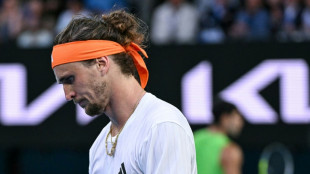
-
 New Dutch government pledges ongoing Ukraine support
New Dutch government pledges ongoing Ukraine support
-
Newcastle still coping with fallout from Isak exit, says Howe
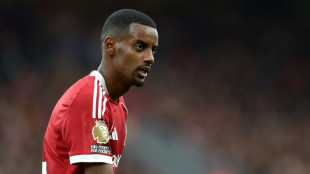
-
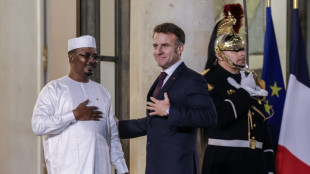 Chad, France eye economic cooperation as they reset strained ties
Chad, France eye economic cooperation as they reset strained ties
-
Real Madrid to play Benfica, PSG face Monaco in Champions League play-offs

-
 Everton winger Grealish set to miss rest of season in World Cup blow
Everton winger Grealish set to miss rest of season in World Cup blow
-
Trump brands Minneapolis nurse killed by federal agents an 'agitator'

-
 Arteta focuses on the positives despite Arsenal stumble
Arteta focuses on the positives despite Arsenal stumble
-
Fijian Drua sign France international back Vakatawa

-
 Kevin Warsh, a former Fed 'hawk' now in tune with Trump
Kevin Warsh, a former Fed 'hawk' now in tune with Trump
-
Zverev rails at Alcaraz timeout in 'one of the best battles ever'

-
 Turkey leads Iran diplomatic push as Trump softens strike threat
Turkey leads Iran diplomatic push as Trump softens strike threat
-
Zelensky backs energy ceasefire, Russia bombs Ukraine despite Trump intervention

-
 'Superman' Li Ka-shing, Hong Kong billionaire behind Panama ports deal
'Superman' Li Ka-shing, Hong Kong billionaire behind Panama ports deal
-
Skiing great Lindsey Vonn crashes at Crans-Montana, one week before Olympics

| SCS | 0.12% | 16.14 | $ | |
| JRI | 0.27% | 12.99 | $ | |
| RBGPF | 1.65% | 83.78 | $ | |
| BCC | -1.24% | 79.185 | $ | |
| CMSC | -0.02% | 23.69 | $ | |
| RYCEF | -2.69% | 16 | $ | |
| RELX | -1.56% | 35.61 | $ | |
| NGG | -0.65% | 84.5 | $ | |
| BCE | -0.08% | 25.465 | $ | |
| RIO | -4.67% | 90.885 | $ | |
| GSK | 1.19% | 51.265 | $ | |
| AZN | 0.55% | 93.1 | $ | |
| CMSD | 0.04% | 24.07 | $ | |
| VOD | -0.58% | 14.625 | $ | |
| BTI | -0.11% | 60.145 | $ | |
| BP | -0.67% | 37.785 | $ |
Trump’s 50% tariffs on europe
In a move that has sent shockwaves through global markets, U.S. President Donald Trump has threatened to impose 50% tariffs on imports from the European Union, initially set for June 1, 2025, but later delayed to July 9 to allow for negotiations. This aggressive trade policy has sparked intense debate about its motivations and potential consequences for the European economy, which relies heavily on exports to the United States. The proposed tariffs, described as a tool to reshape global trade dynamics, raise questions about the strategic intent behind such a drastic measure and its implications for transatlantic relations.
The European Union, a key trading partner of the United States, exported goods worth billions to the U.S. in 2024, with sectors like pharmaceuticals, automotive, and luxury goods leading the charge. A 50% tariff would significantly increase the cost of these goods, potentially reducing demand and squeezing profit margins for European companies. For instance, Germany’s automotive industry, including brands like BMW and Porsche, faces heightened risks, as does France’s luxury sector, which employs over 600,000 people. Italy’s high-end leather goods and the European aerospace sector, exemplified by companies like Airbus, could also face severe disruptions. The European Commission has estimated that such tariffs could shave 0.5% off the EU’s GDP, a substantial blow to an economy already grappling with global uncertainties.
Trump’s rationale appears rooted in a long-standing belief that tariffs are a solution to perceived trade imbalances. He has publicly expressed frustration with the EU, accusing it of being “very difficult to deal with” and slow to negotiate. His administration argues that the EU benefits disproportionately from trade with the U.S., a claim that resonates with his domestic base but overlooks the mutual benefits of transatlantic commerce. The president’s strategy seems to leverage tariffs as a negotiating tactic, pressuring the EU to concede to terms more favourable to U.S. interests, such as increased purchases of American goods like soya beans, arms, and liquefied natural gas. The delay to July 9, following a phone call with European Commission President Ursula von der Leyen, suggests a willingness to negotiate, but the threat of tariffs remains a powerful bargaining chip.
Critics argue that Trump’s approach is less about economic fairness and more about political posturing. By targeting the EU, he reinforces a narrative of protecting American jobs and manufacturing, a cornerstone of his economic agenda. His recent announcement to double steel tariffs to 50% and impose 25% tariffs on autos underscores this focus on domestic industry. However, the broader economic fallout could be severe. European officials, including Germany’s Lars Klingbeil, have warned that such a trade conflict harms both sides, endangering jobs and economic stability. The EU has signalled readiness to retaliate with counter-tariffs, potentially targeting U.S. products like Boeing aircraft, which could escalate tensions into a full-blown trade war.
The timing of the tariff threat adds to its disruptive potential. Europe’s economy, while showing resilience in some areas—Germany’s GDP grew unexpectedly in early 2025 due to strong exports—is not immune to external shocks. The uncertainty surrounding Trump’s tariffs has already rattled markets, with European stocks tumbling after the initial announcement before recovering slightly upon the delay. Companies like HP, which cited tariff-related costs as a factor in cutting earnings forecasts, illustrate the ripple effects on global supply chains. Small businesses and consumers, particularly in the U.S., could face higher prices, while European exporters risk losing market share if forced to absorb tariff costs.
Trump’s tariff strategy also faces legal challenges. A U.S. trade court recently ruled that his use of emergency powers to impose tariffs was unlawful, though an appeals court temporarily reinstated them. This legal uncertainty complicates the administration’s plans, yet Trump’s team has hinted at alternative mechanisms, such as invoking a 1930 trade law to bypass judicial rulings. These manoeuvres reflect a determination to press forward, regardless of opposition, aligning with Trump’s broader goal of reshaping the global economic order.
For the EU, the path forward involves balancing diplomacy with resolve. The European Commission, led by Ursula von der Leyen, has committed to fast-tracking trade talks, with negotiations set to intensify in the coming weeks. EU Trade Commissioner Maroš Šefčovič is expected to engage directly with U.S. counterparts, aiming for a deal that could reduce tariffs to zero on industrial goods. However, the EU remains firm in defending its interests, preparing countermeasures should talks falter. The bloc’s unity will be tested as member states like Italy, with leaders like Giorgia Meloni fostering ties with the White House, push for compromise, while others advocate a harder line.
The stakes are high for both sides. A failure to reach an agreement by July 9 could trigger a tariff regime that disrupts supply chains, inflates consumer prices, and erodes economic confidence. For Trump, the tariffs are a high-stakes gamble to assert U.S. dominance in global trade, but they risk alienating a key ally and destabilising an interconnected economy. For Europe, the challenge is to navigate this turbulent period without sacrificing its economic vitality or succumbing to pressure. As negotiations unfold, the world watches closely, aware that the outcome will shape the future of transatlantic trade and beyond.

Trump's attack on the Dollar

Greenland Deal – and now?

Trump's hesitation in Iran

Cuba’s bleak oil crisis

Venezuela’s economic roadmap

Iran unrest and US threats

Iran's collapse fuels Revolt

Brexit's broken promises

France's debt spiral Crisis

Trump preps Allies for Ven Op

UK politics: Outlook for 2026




